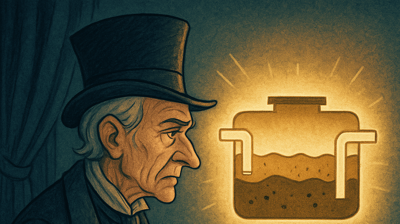Bacteria play a critical and often misunderstood role in the health and function of septic tanks.
Without these microscopic organisms, septic systems would fail to properly process household wastewater, leading to blockages, pollution, and expensive repairs.
Why Bacteria Matter in Septic Tanks
Septic systems rely on naturally occurring bacteria to break down solid waste and treat water before it reenters the environment.
When wastewater enters the septic tank, gravity separates solids from liquids. Then bacteria digest much of the solid material through a process called anaerobic digestion, which occurs in the oxygen-free environment of the tank.
This process generates gases (such as methane and hydrogen sulfide) and leaves residual sludge. The sludge must eventually be pumped out, but is significantly reduced by bacterial activity.
How Bacteria Protect Your Home and the Environment
After the initial breakdown in the tank, the partially treated water — called effluent — flows into the absorption area or leach field. Here, bacteria continue their work.
A biomat composed of bacteria and other microbes forms around the leach field and further degrades organic material, protecting groundwater by naturally filtering out remaining pollutants and viruses.
What Can Kill Septic Bacteria?
Despite their essential role, the helpful bacteria in septic systems are vulnerable to many everyday household products.
Anti-bacterial cleaning agents, bleach, ammonia, drain cleaners, some medications (such as antibiotics), and even certain soaps can kill good bacteria, compromising your septic system.
When these chemicals enter your tank, solids aren't broken down effectively. This can lead to backups, clogged lines, and system failures.
What Are the Best Practices for Maintaining Healthy Bacteria?
Use only septic-safe or natural cleaning products, such as vinegar, baking soda, or borax.
Avoid flushing paints, oils, or harsh chemicals down any drain.
Be mindful that even medications like antibiotics can disrupt your tank's bacterial balance.
Remember, while beneficial, bacterial additives should not replace routine tank pumping and maintenance. Regularly scheduled pumping (every 1–2 years) is still necessary, as even healthy bacteria cannot break down every component of waste.
What is the Role of Bacterial Additives?
Bacterial additivesreplenish and enhance bacterial activity, helping maintain efficient waste breakdown, control odors, and protect your system between pumping appointments.
Bacterial additives or enzyme treatments can be used even if you accidentally let harsh chemicals or medications go down the drain.
However, additives are a supplement, not a replacement, for professional septic maintenance.
Summing it All Up...
The bacteria in septic systems are essential for breaking down waste, preventing backups, and ensuring environmentally safe water treatment.
Protecting and supporting these bacteria with safe practices and periodic additives helps your septic system last longer and work more efficiently.
Contact us to order bacterial additives for your system.




